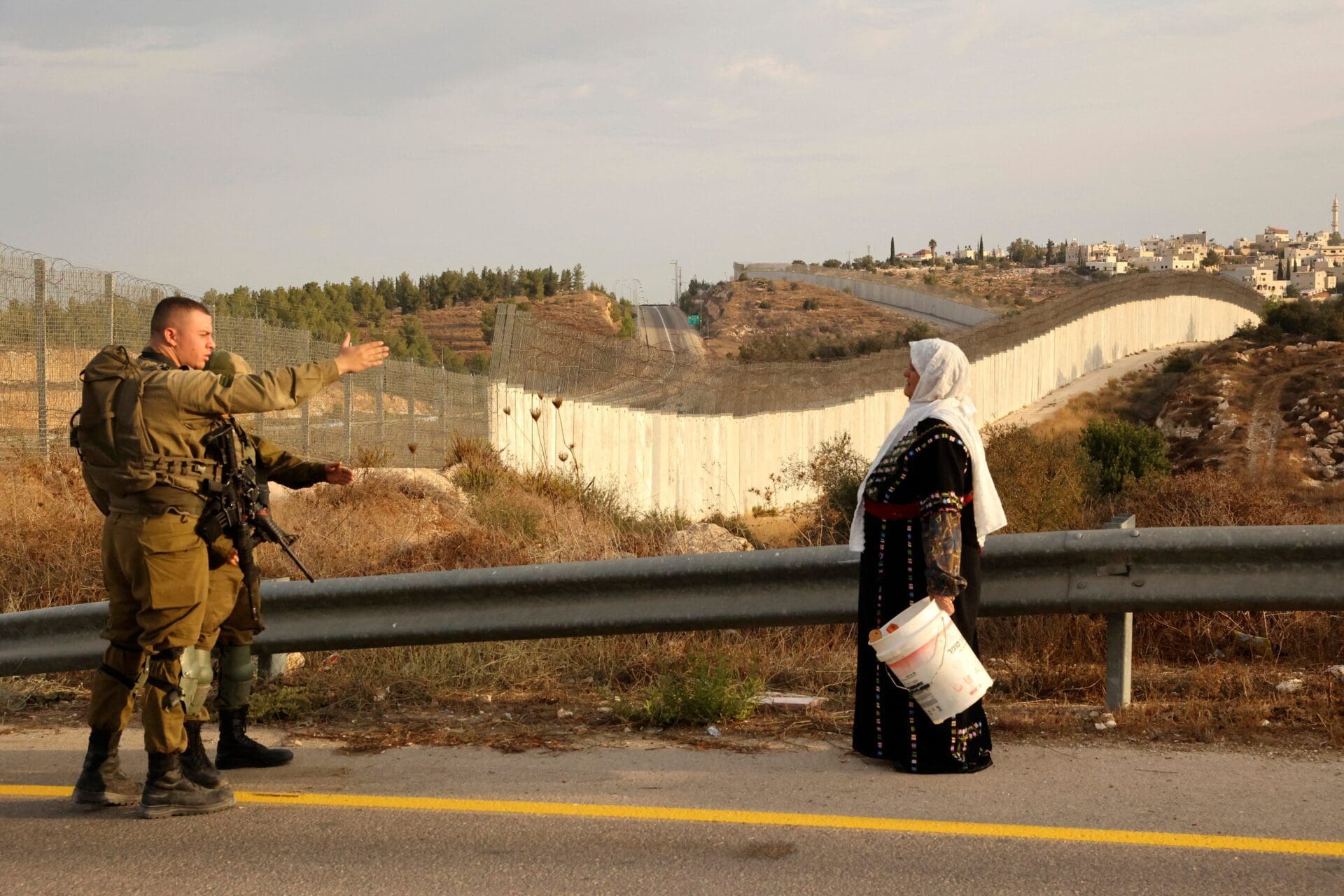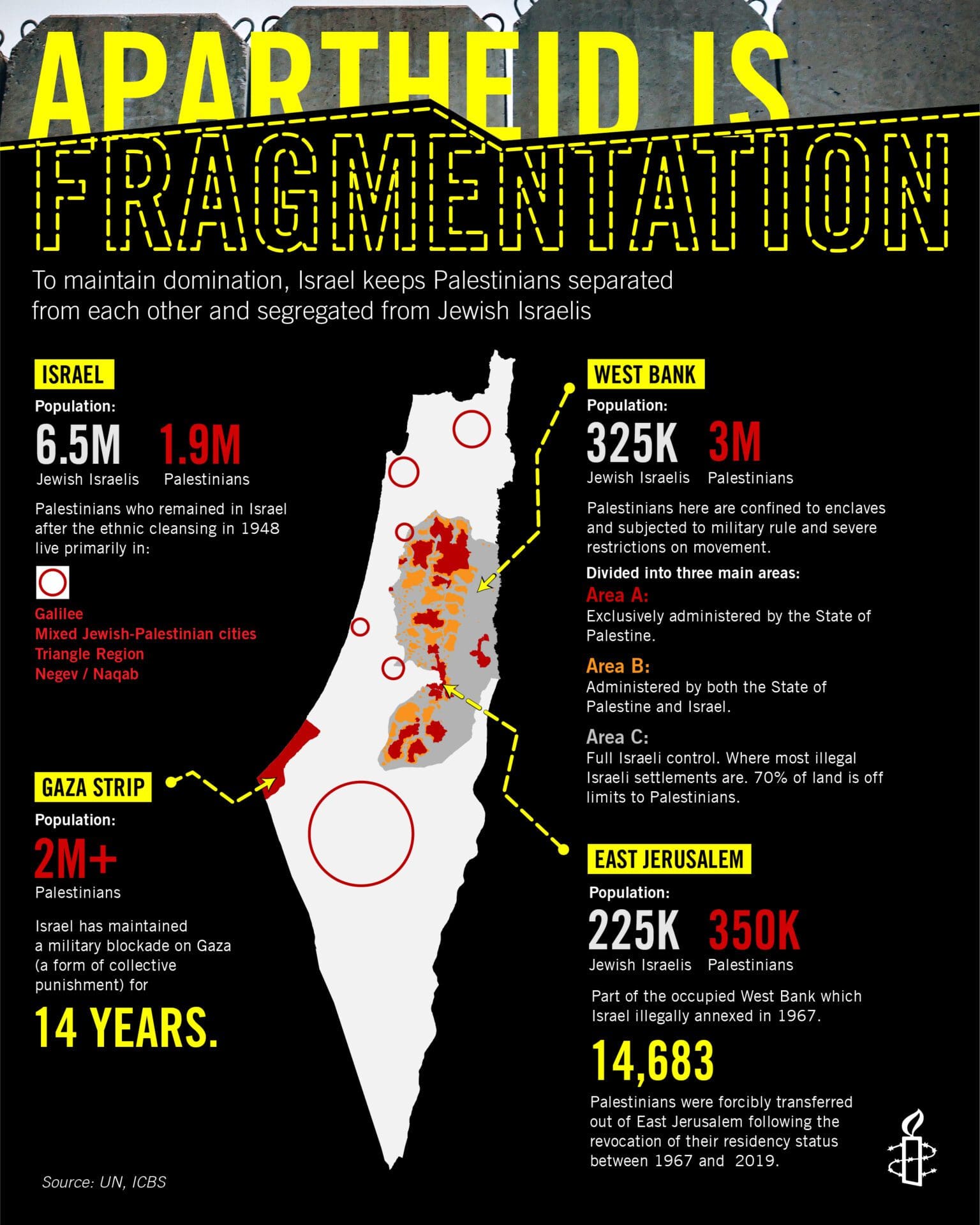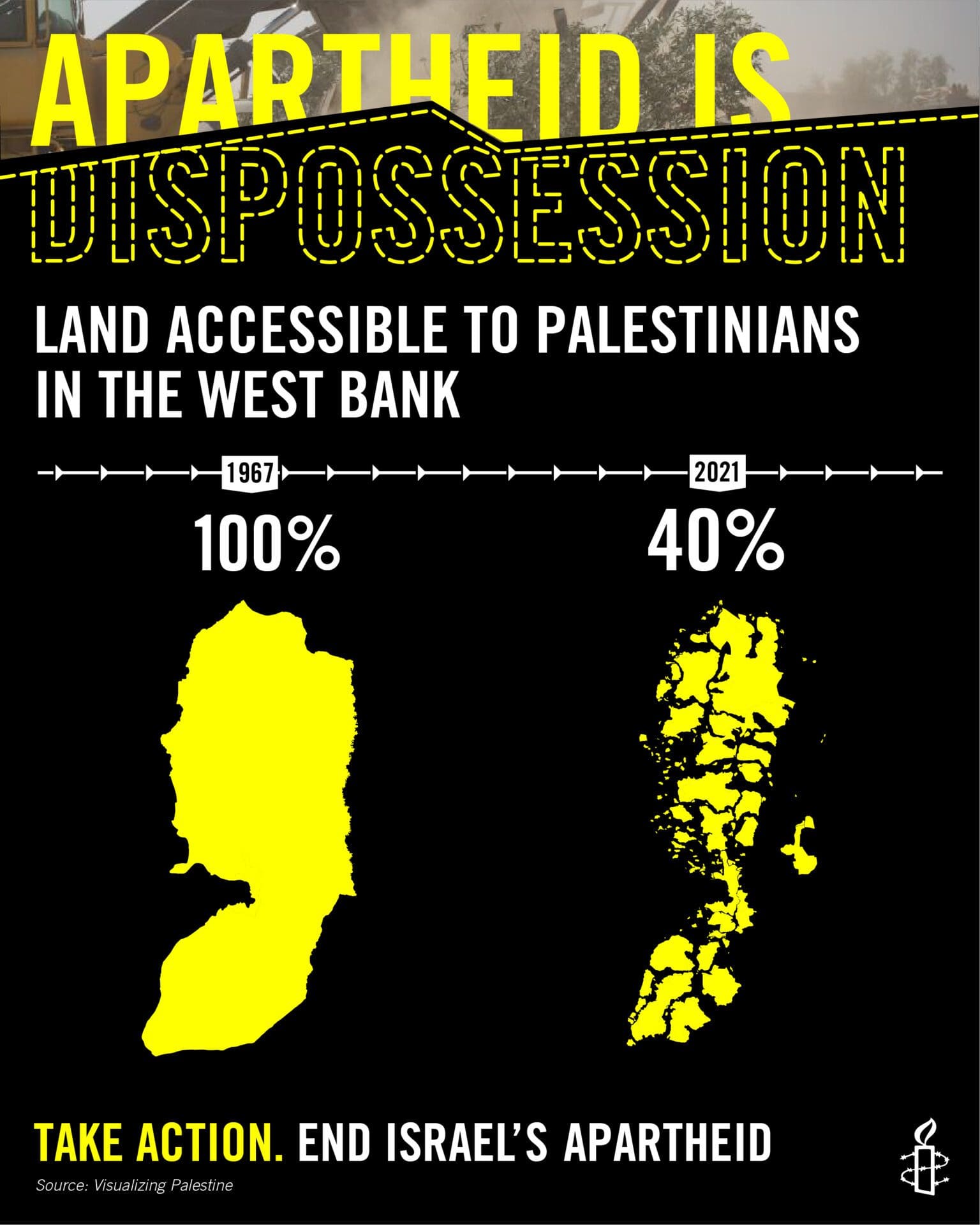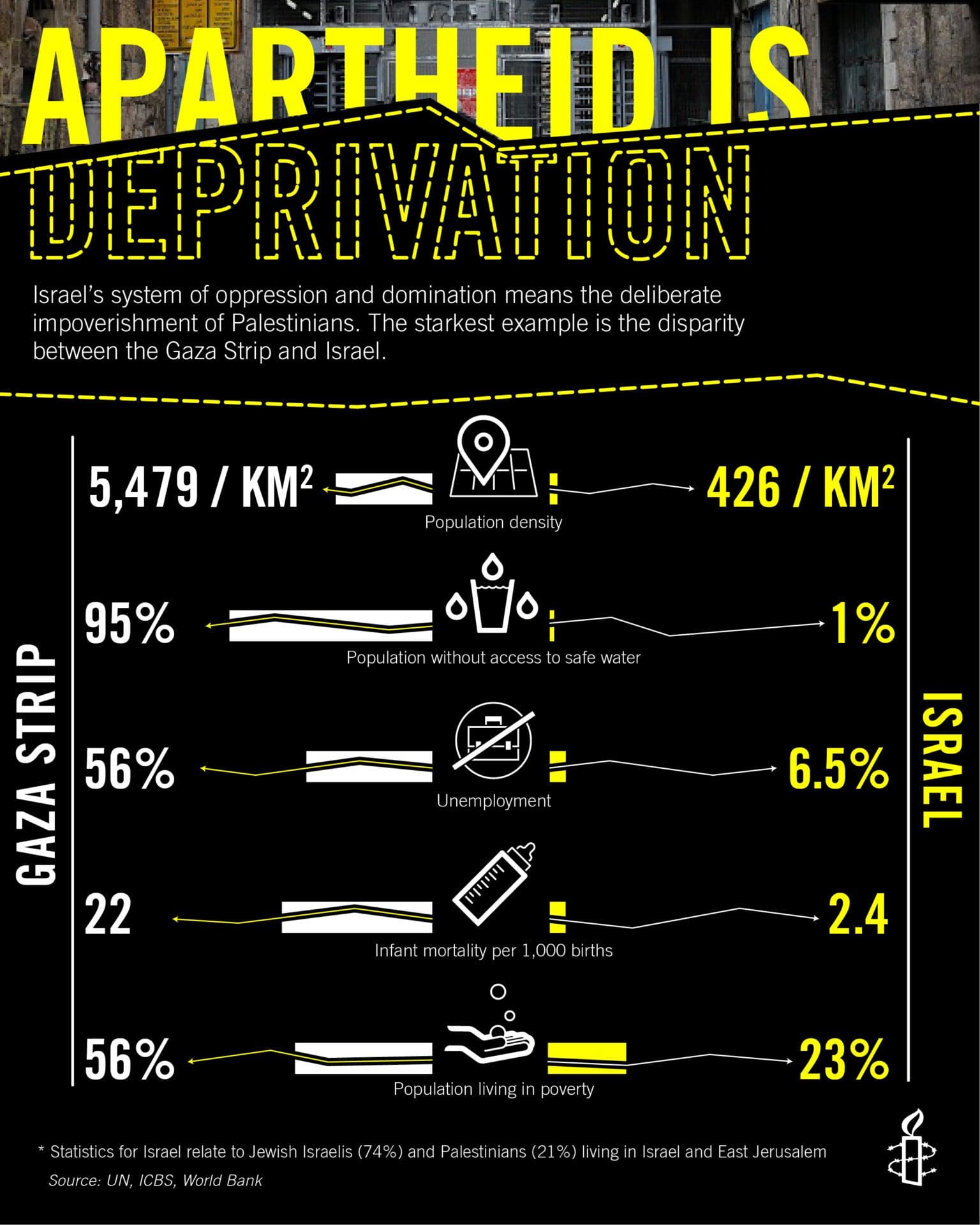Amnesty International’s new research report, Israel’s Apartheid Against Palestinians: Cruel System of Domination and Crime Against Humanity shows that Israeli authorities impose a system of domination and oppression against the Palestinian people in Israel and the Occupied Palestinian Territories (OPT), and against Palestinian refugees. Laws, policies, and institutional practices all work to expel, fragment, and dispossess Palestinians of their land and property, and deprive Palestinians of their human rights. We conclude this treatment amounts to an institutionalized regime of oppression and domination defined as apartheid under international law.
Amnesty’s research, campaigns, advocacy, and statements pertaining to Israel are focused on the actions of the Israeli government — they are not, and never will be, a condemnation of Judaism or the Jewish people. Antisemitism is antithetical to everything Amnesty represents as a human rights organization.
What is Apartheid
Apartheid is a violation of public international law, a grave human rights violation, and a crime against humanity. It constitutes both a system (formed of laws, policies, and practices) and a crime (specific acts).
The term “apartheid” was originally used to refer to a political system in South Africa which explicitly enforced racial segregation, and the domination and oppression of one racial group by another. It has since been adopted by the international community to condemn and criminalize such systems and practices wherever they occur in the world.
Three main international treaties prohibit and/or explicitly criminalize apartheid: the International Convention on the Elimination of All Forms of Racial Discrimination (ICERD); the International Convention on the Suppression and Punishment of the Crime of Apartheid (Apartheid Convention); and the Rome Statute of the International Criminal Court (Rome Statute).
The Apartheid Convention and the Rome Statute define apartheid as a crime against humanity, committed when any ‘inhuman’ or ‘inhumane’ act is perpetrated in the context of an ‘institutionalized regime’ of systematic ‘oppression’ and ‘domination’ by one racial group over another, with the intent to maintain that system. Inhuman/inhumane acts include unlawful killing and serious injury, torture, forcible transfer, persecution, and the denial of basic rights and freedoms.
Human Rights Education Course
Amnesty International has created a free 90-minute course called “Deconstructing Israel’s Apartheid against Palestinians.” To learn more about the crime of apartheid in international law, what apartheid looks like in Israel and the Occupied Palestinian Territories, and how it affects Palestinians’ lives, sign up for our course on Amnesty International’s human rights education academy.
Why Is Amnesty International Campaigning Against Apartheid?
Apartheid is a crime against humanity and is not acceptable anywhere in the world. When a crime against humanity is committed, we all have an obligation to help end it and hold those responsible to account. This report serves to amplify the growing calls from Palestinian and Israeli civil society for justice and to encourage world leaders to strive for peace based on justice including human rights and accountability. Our research and campaign aim to end the government of Israel’s apartheid against Palestinians.
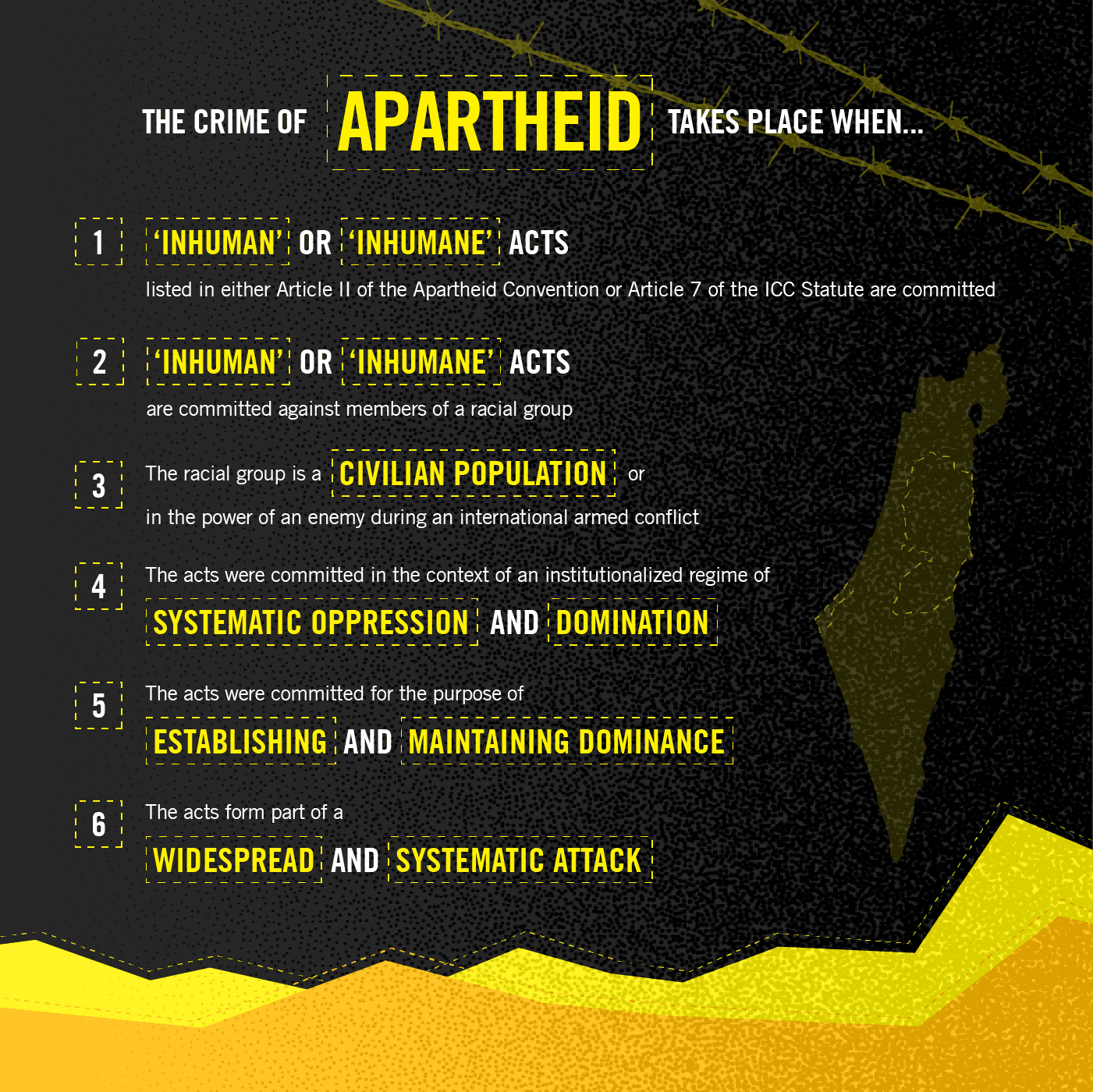
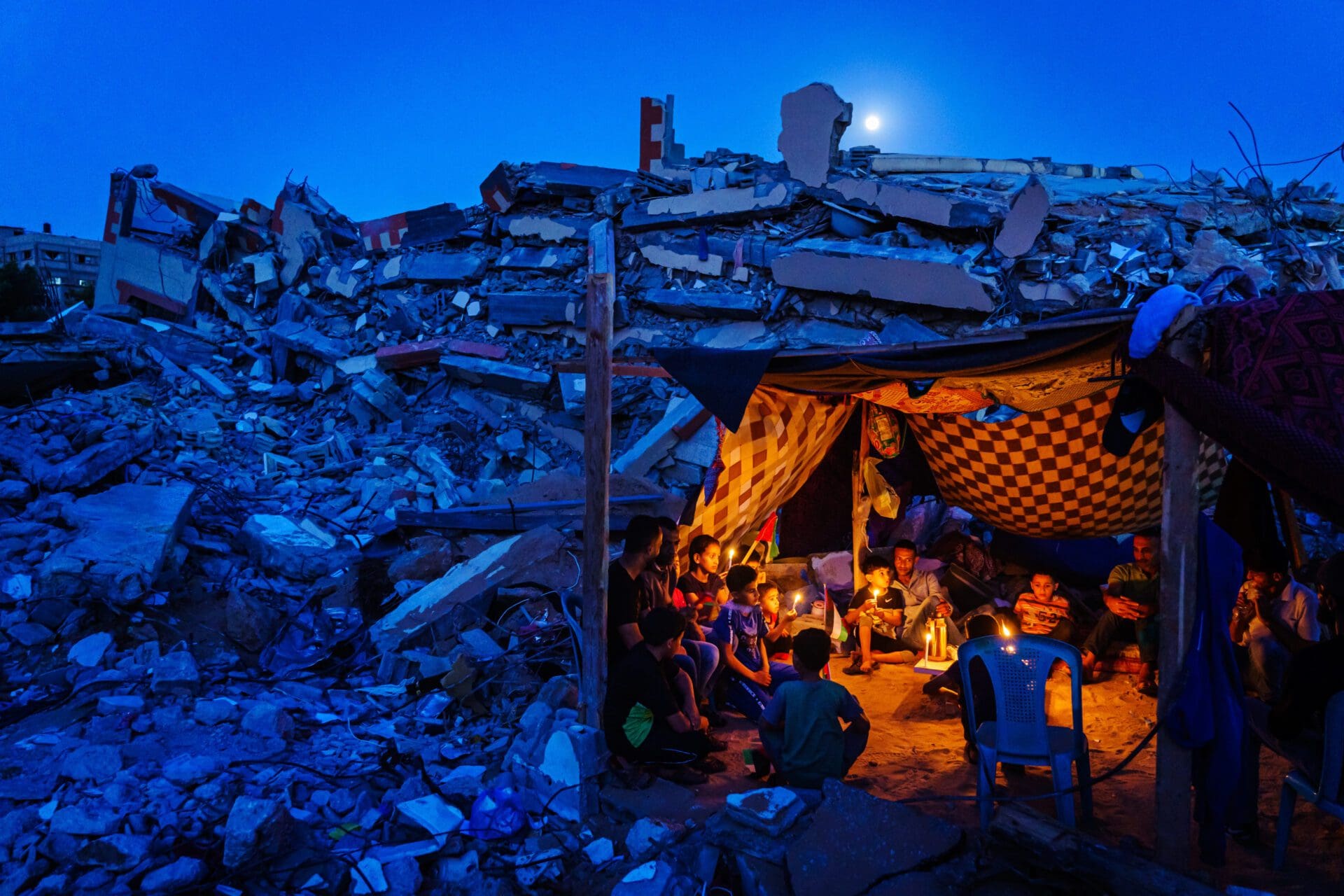
TAKE ACTION
The Israeli Government’s System of Apartheid Must End
Amnesty’s research confirms that the government of Israel has created and maintains laws, policies, and practices that deliberately oppress Palestinians. This includes racist seizures of property, and policies that make it impossible for many Palestinians to build homes. Additional violations include unlawful killing and serious injury, torture, forcible transfer, persecution, and the denial of many other basic rights and freedoms. We MUST speak out to end it.
Take action: Send your letter directly to Israeli Prime Minister Benjamin Netanyahu now
We’ve drafted a letter for you to send. As a first step, we’re urging Prime Minister Netanyahu to cancel all orders for forced evictions and home demolitions against Palestinians, and end forced displacement of Palestinians.
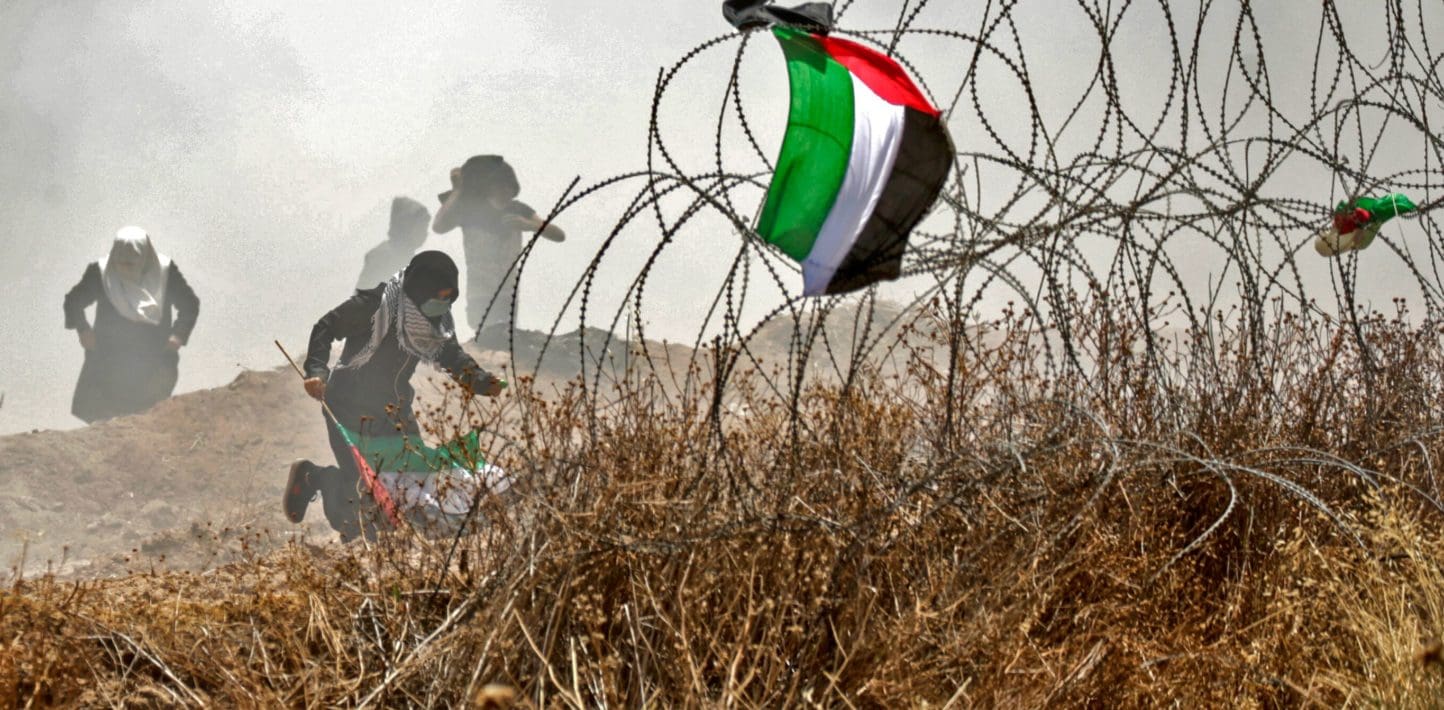
End Apartheid Against Palestinians by the Government of Israel
Palestinian Life under Apartheid in Israel and the OPT
Denied a Home: Demolitions and Forced Evictions
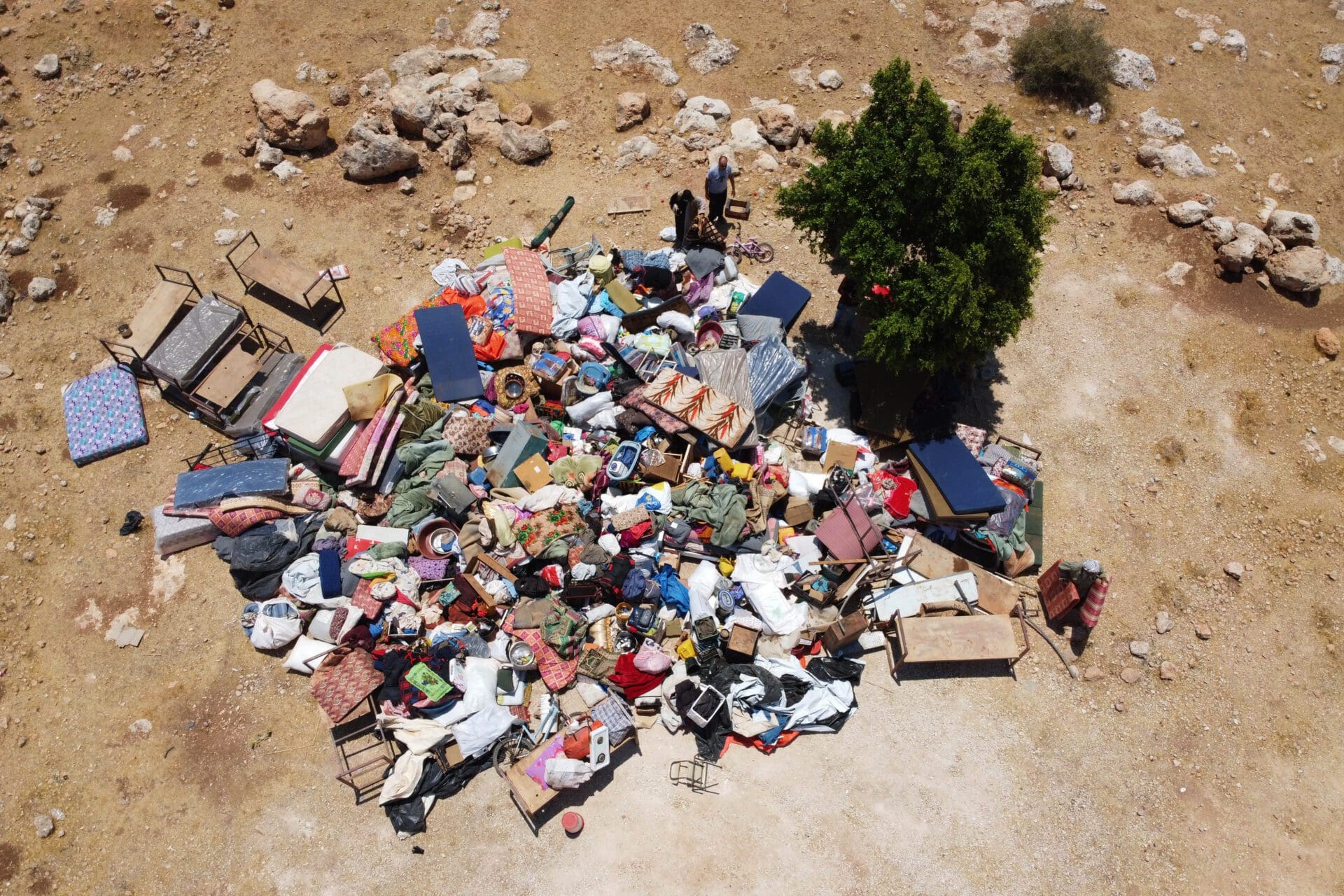

Palestinians are systematically subjected to home demolitions and forced evictions, and live in constant fear of losing their homes.
For more than 73 years, the government of Israel has forcibly displaced entire Palestinian communities. Hundreds of thousands of Palestinians’ homes have been demolished, causing terrible trauma and suffering. More than 6 million Palestinians remain refugees, the vast majority of whom live in refugee camps including outside of Israel/OPT. There are over 100,000 Palestinians in the OPT and another 68,000 inside of Israel at imminent risk of losing their homes, many for the second or third time.
Palestinians are caught in a Catch-22 situation. The Israeli government requires them to obtain a permit to build or even erect a structure such as a tent, but – unlike Jewish Israeli applicants — rarely issues them a permit. Many Palestinians are forced to build without permits. The Israeli government then demolishes Palestinian homes on the basis that they were built “illegally”. The Israeli government uses these discriminatory planning and zoning policies to create unbearable living conditions to force Palestinians to leave their homes to allow for the expansion of Jewish settlements.
Mohammed Al-Rajabi, a resident of Al-Bustan area in Silwan, whose home was demolished by Israeli authorities on 23 June 2020 on the basis that it was built “illegally”, described to Amnesty International the devastating impact on his family:
“This is extremely hard to deal with. It might be difficult to put into words… and I sensed that it was harder on my kids than on us. They were really excited for us to have this new home. I’m going to keep the photos from that day and show them to my children when they grow up, so they do not forget what happened to us. I will tell them, ‘you see what kind of memories I have to pass on to you?’ My plan was for them to have a warm family home close to their loved ones and family members. Now I’m passing on the memories of their first childhood home being destroyed.”
Fragmented Lives: Separation of Palestinian Families
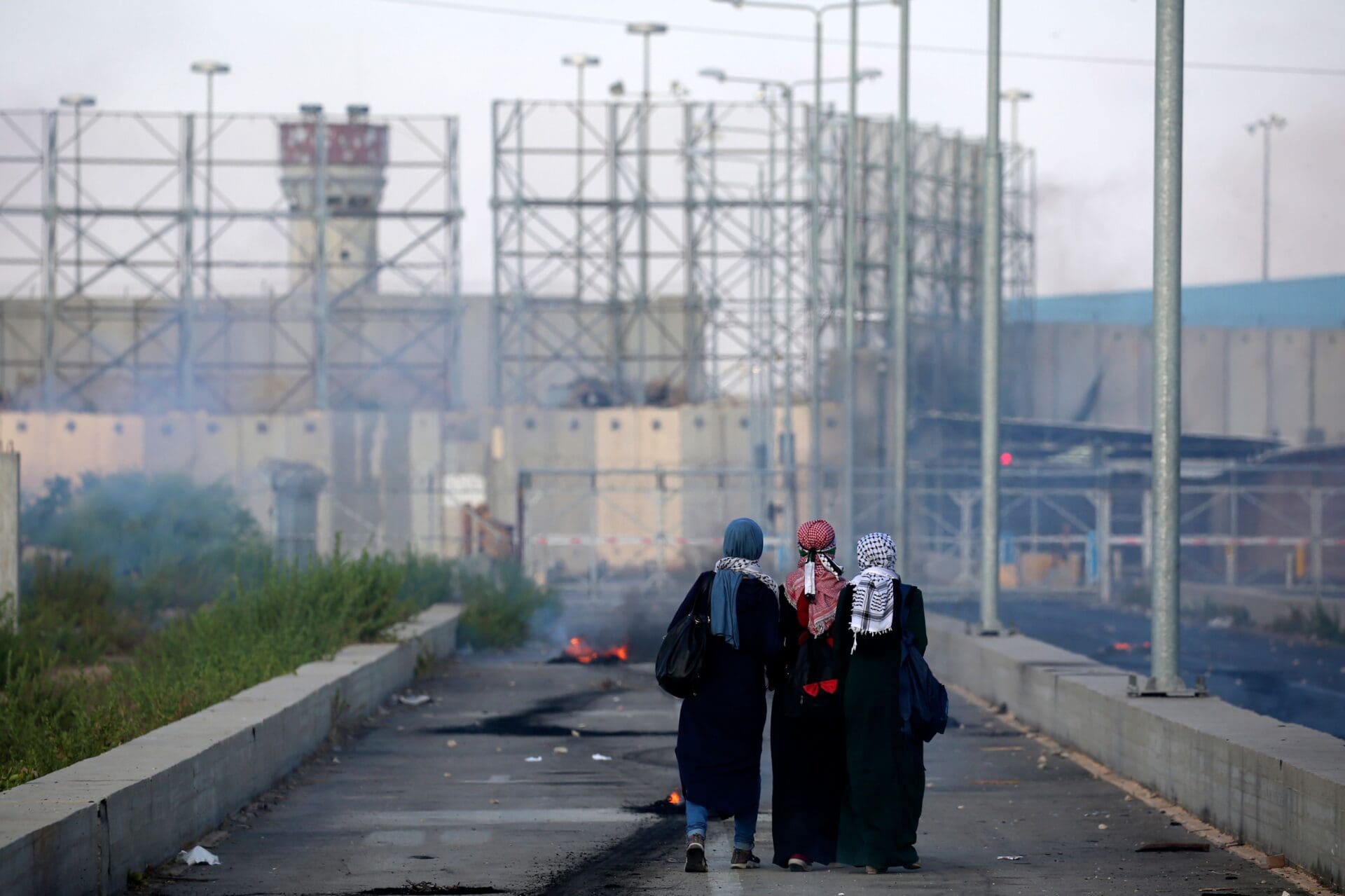

The government of Israel has long used discriminatory laws and policies to separate Palestinians from their families. For example, Palestinians from the West Bank and Gaza cannot gain legal status in Israel or occupied East Jerusalem through marriage, denying their rights to family unification. This policy has forced thousands of Palestinians to live apart from their loved ones; others are forced to go abroad, or live in constant fear of being arrested, expelled, or deported.
These measures explicitly target Palestinians, and not Jewish Israelis, and are primarily guided by demographic considerations that aim to minimize Palestinian presence inside Israel/OPT.
Sumaia, was born and raised in Lod in central Israel. She married her husband, who is from the Gaza Strip, in 1998 and he moved to live with her in Lod. In 2000, Sumaia and her husband began the process of applying for family unification, so they could live together legally. The family unification process took 18 years, during which the couple lived in fear and anxiety. Sumaia told Amnesty:
“The government is controlling every detail of our lives, they are in our bedroom, in our homes. One of the most extreme cases was when they arrested my husband in 2004 while I was giving birth to one of my daughters…while I was in the delivery room they arrested him!”
Violence Under Seige
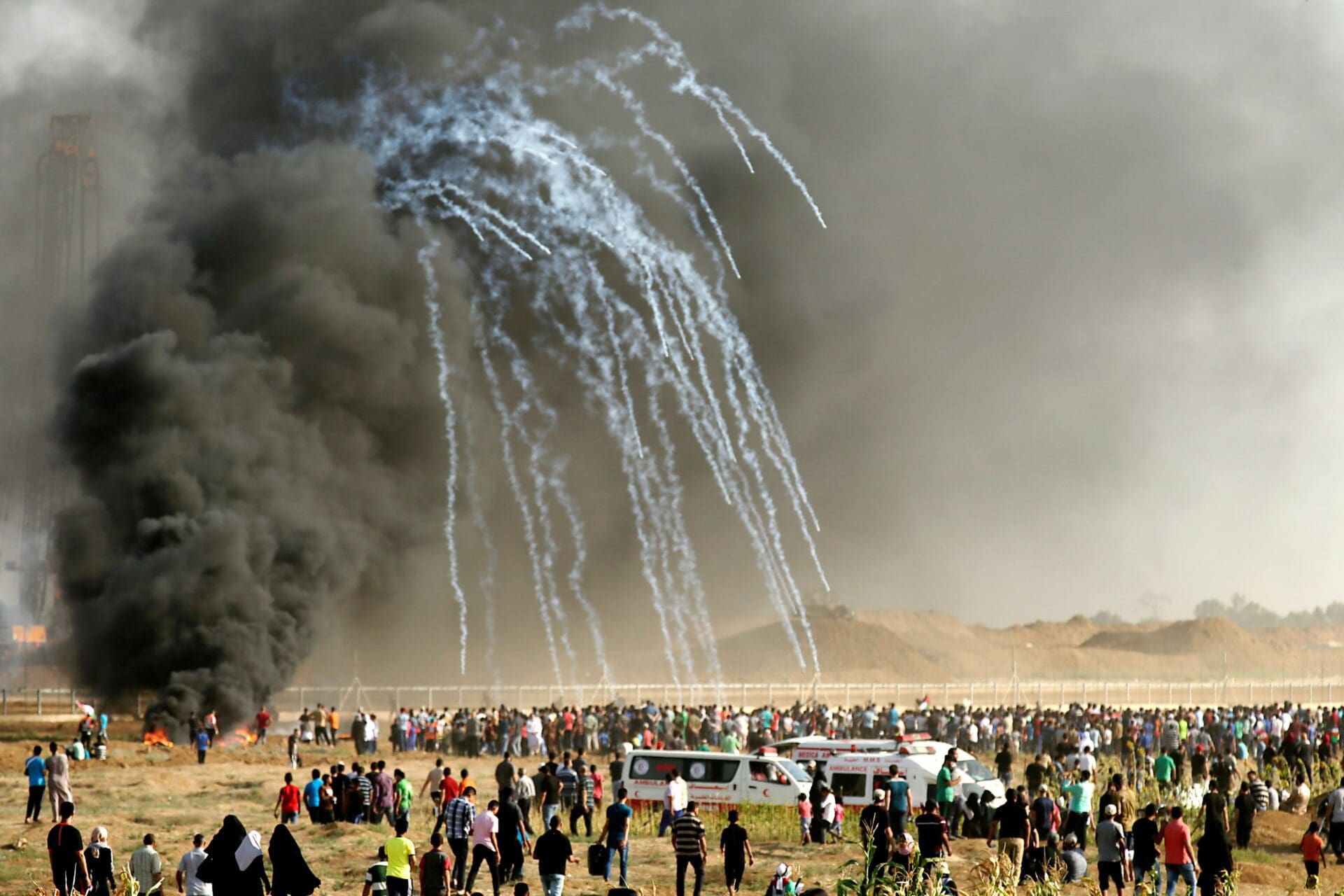

Over the past 14 years, more than 2 million Palestinians in the Gaza Strip have been living under the Israeli government’s unlawful blockade. Along with four major military offensives, the blockade has had catastrophic consequences for the people of Gaza.
The blockade is a form of collective punishment. It forces Gaza’s population – the majority of whom are refugees or their descendants who fled in 1948 – to live in increasingly dire conditions. There are severe shortages of housing, drinking water, electricity, essential medicines and medical care, food, educational equipment and building materials. In 2020, Gaza had the world’s highest unemployment rate, and more than half of its population was living below the poverty line.
On March 30, 2018, Palestinians in Gaza launched the Great March of Return, a series of weekly mass demonstrations along the fence between Gaza and Israel.
They were demanding their right to return to their villages and towns in what is now Israel, as well as an end to the Israeli government’s blockade on Gaza. The response was brutal: by the end of 2019, Israeli forces had killed 214 civilians, including 46 children, and injured more than 8,000 others with live ammunition. A total of 156 of those injured had to have limbs amputated.
More than 1,200 patients require long-term, complex and expensive therapy and rehabilitation, and tens of thousands more require psycho-social support -none of which are widely available in Gaza.
The blockade prevents Palestinians from accessing adequate healthcare, life-saving and other emergency medical treatment only available outside Gaza. The Israeli authorities often delay these permits and sometimes fail to provide them at all.
Adham Al-Hajjar, 36, is a freelance journalist and lives in Gaza City. On April 6, 2018, while he was covering the Great March of Return demonstrations, Israeli snipers positioned along the fence separating Gaza from Israel shot him. He is unable to get the medical help he needs in Gaza because of the debilitated health services there.
“The bullet that entered my leg did not just enter and leave my body. It entered and stopped everything; it stopped my life. Just because a soldier pulled the trigger without thinking of how it would devastate my life. Did he or she ever think about what this would cause? I am walking around as a dead man, everything in my life froze from the moment that bullet entered my leg.”
POLICY RECOMMENDATIONS TO END THE ABUSES
Amnesty International is providing the following wide-ranging recommendations to the Israeli government and other relevant stakeholders to dismantle the system of apartheid against Palestinians and end the associated human rights violations. We are making recommendations to the Israeli authorities covering laws, practices, and policies that relate to Palestinians in general, as well as specific ones relating to each of the domains of control – Israel, East Jerusalem, the rest of the West Bank and the Gaza Strip – and Palestinian refugees outside Israel and the OPT. We also include a few recommendations for the Palestinian authorities.
For a full list of recommendations, please download and read the full report
Recommendations to the Government of Israel
- End the system of apartheid by dismantling measures of discrimination, segregation and oppression currently in place against the Palestinian population and undertake a review of all laws, regulations, policies, and practices that discriminate on racial, ethnic or religious grounds, and repeal or amend them to bring them into line with international human rights law and standards — in particular the government of Israel’s obligations to ensure the principle of non-discrimination under international law.
- Grant equal and full human rights to all Palestinians in Israel and the OPT in line with principles of international human rights law and without discrimination, while ensuring respect for protections guaranteed for Palestinians in the OPT under international humanitarian law.
- Immediately order all state authorities to end and refrain from all future conduct that violates international law, including: forcible transfer of population, arbitrary arrest, administrative detention, torture and other ill-treatment, unlawful killings and infliction of injuries, and arbitrary restrictions on Palestinians’ freedom of movement and residence in their communities; and respect their right to family life, and their rights to access livelihoods, housing, food, water, essential healthcare services, and education.
AIUSA recommendations to the U.S. Government
To meaningfully uphold human rights, as required by U.S. law and international law, we call on the Biden administration and Congress to take the key actions detailed below.
- End all U.S. support for the Israeli government’s rights violations and crimes against humanity against Palestinians—particularly the unlawful campaign of forced displacement via home demolitions, evictions, and settlement expansion in occupied East Jerusalem and the OPT, including by:
- Withholding additional military aid, suspending arms transfers, and blocking imports of goods made in unlawful settlements.
- Unequivocally demanding cancellation of all standing eviction and demolition orders and a moratorium on future orders.
- Calling on Israel’s government to address its responsibility to remedy the discriminatorily denied right to return of Palestinian refugees displaced in past decades’ escalations.
- As required by the Foreign Assistance Act and Leahy Laws, temporarily suspend all arms sales and military aid to the Israeli government—including that which could be used in the crime of apartheid and other grave violations—and condition resumption on a comprehensive vetting and designation of Leahy-ineligible Israeli military units complicit in rights violations.
- Further investigate and issue a public report by relevant departments including the Government Accountability Office (GAO) on the documented use of U.S.-made arms and other aid in human rights abuses (such as in the commission of apartheid) by Israeli forces, as must be done for all countries the U.S. arms.
- Reject Israeli officials’ repression of Palestinian civil society, and demand immediate reversal of the abusive “terrorist” designation and effective outlawing of six Palestinian NGOs
- Further call on the release of all arbitrarily detained Palestinians, including children—many held without charges.
- Demand Israel’s government lift the unlawful Gaza blockade and barriers blocking Gazans’ right to freely leave and return, including for medical treatment and:
- Ending all barriers to and the politicizing of life-saving humanitarian aid to Gaza and the OPT broadly,
- Ceasing unlawful and arbitrary restrictions on Palestinians’ right of free movement across the OPT.
- Press Israeli officials to repeal cruel, discriminatory policies that deprive Palestinians’ human rights such as the nation-state law, the cruel barring of Palestinian family reunification between the OPT and Israel, and the arbitrary deprival of citizenship and/or (in East Jerusalem) residency.
- Additionally insist officials provide Palestinians equitable access to critical resources, land, public services, and social and economic rights.
- Pursuant to 22 U.S.C. § 8213, support international investigative and accountability measures for crimes under international law committed in Israel and the OPT by all parties, including Israeli authorities.
Click here to read our full list of calls for human rights action by the Biden Administration
Resources & More Information
MEDIA RESOURCES
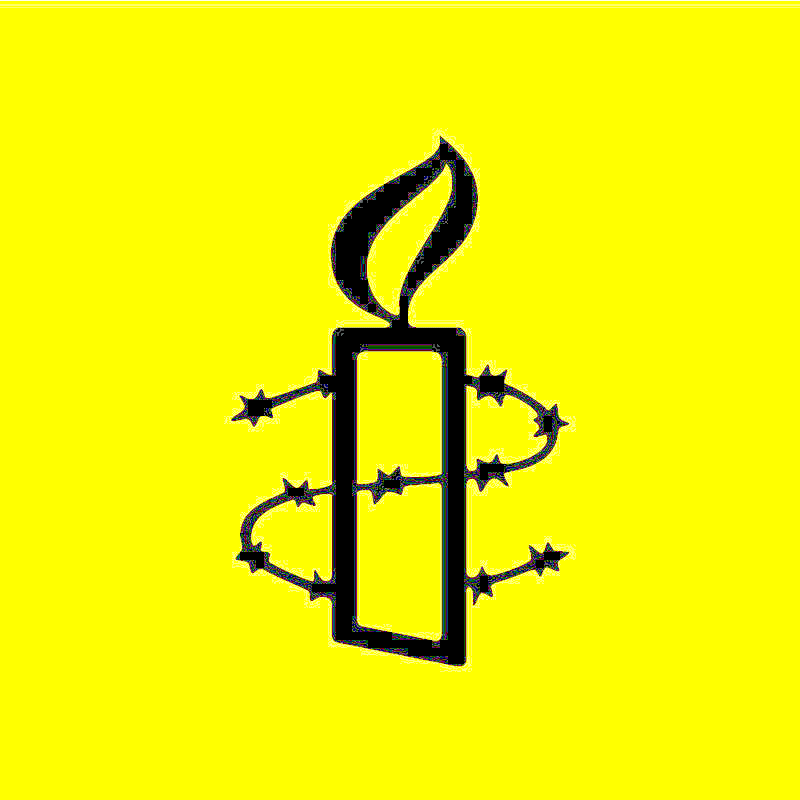

May 23, 2022
Scrap Plans for Forced Transfer of Palestinian Bedouin Village Ras Jrabah in the Negev/Naqab
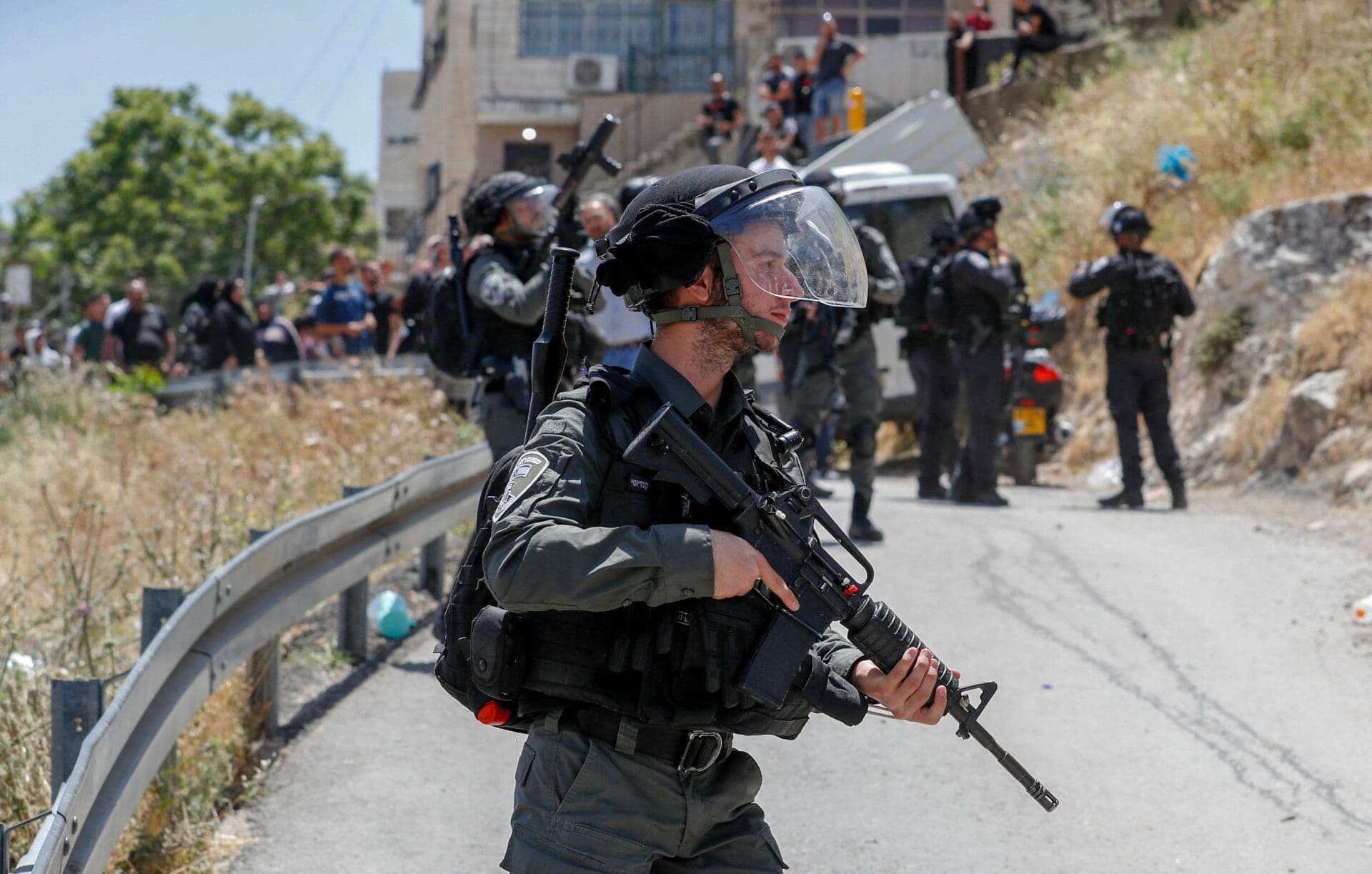

May 11, 2022
Increase in Unlawful Killings and Other Crimes Highlights Urgent Need to End Israel’s Apartheid Against Palestinians


March 23, 2022
Israel/OPT: Israel is Committing Apartheid, Says UN Special Rapporteur
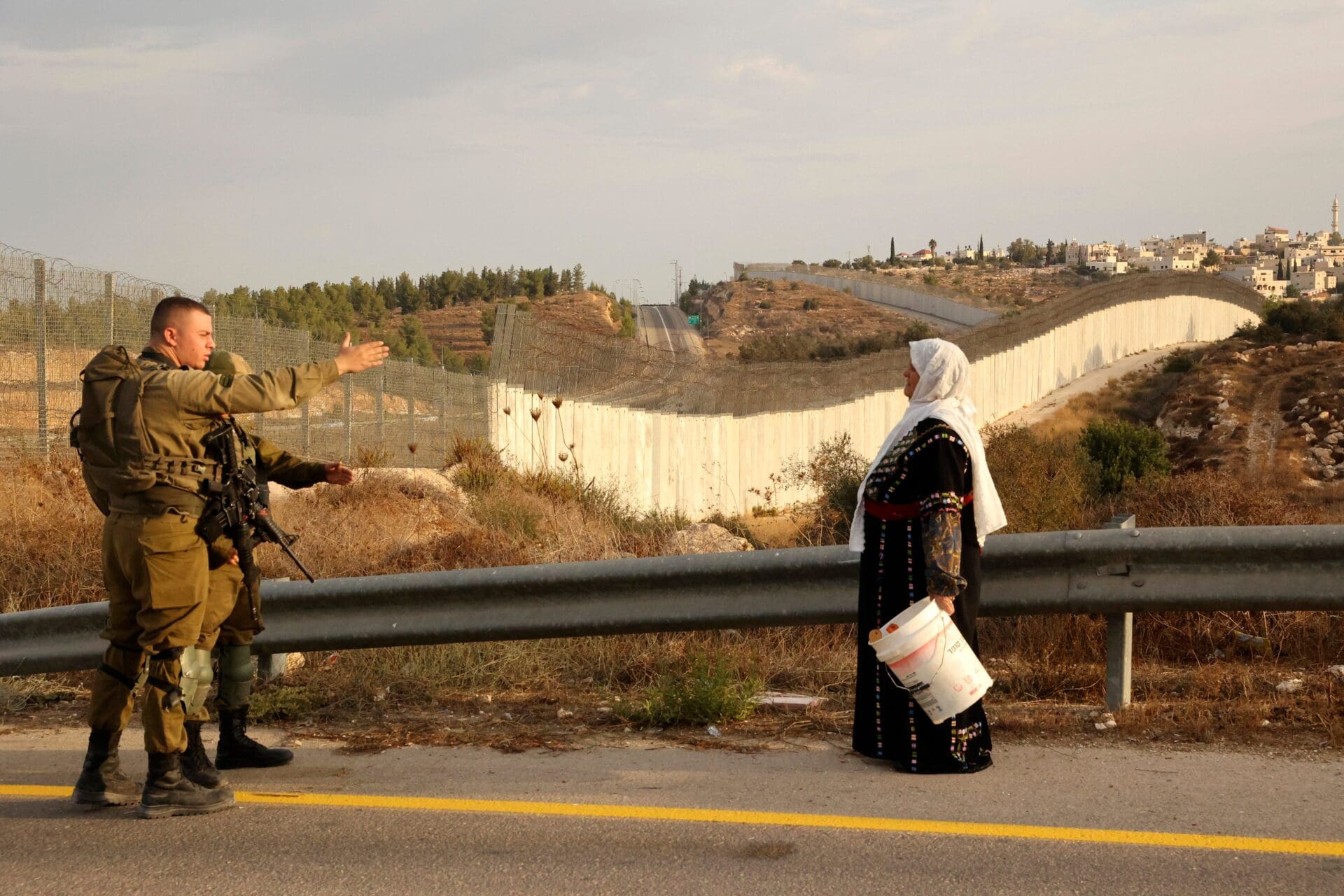

February 1, 2022
New Report Finds Israeli Authorities Are Committing Crime Against Humanity of Apartheid Against Palestinians In Israel And In The Occupied Palestinian Territories
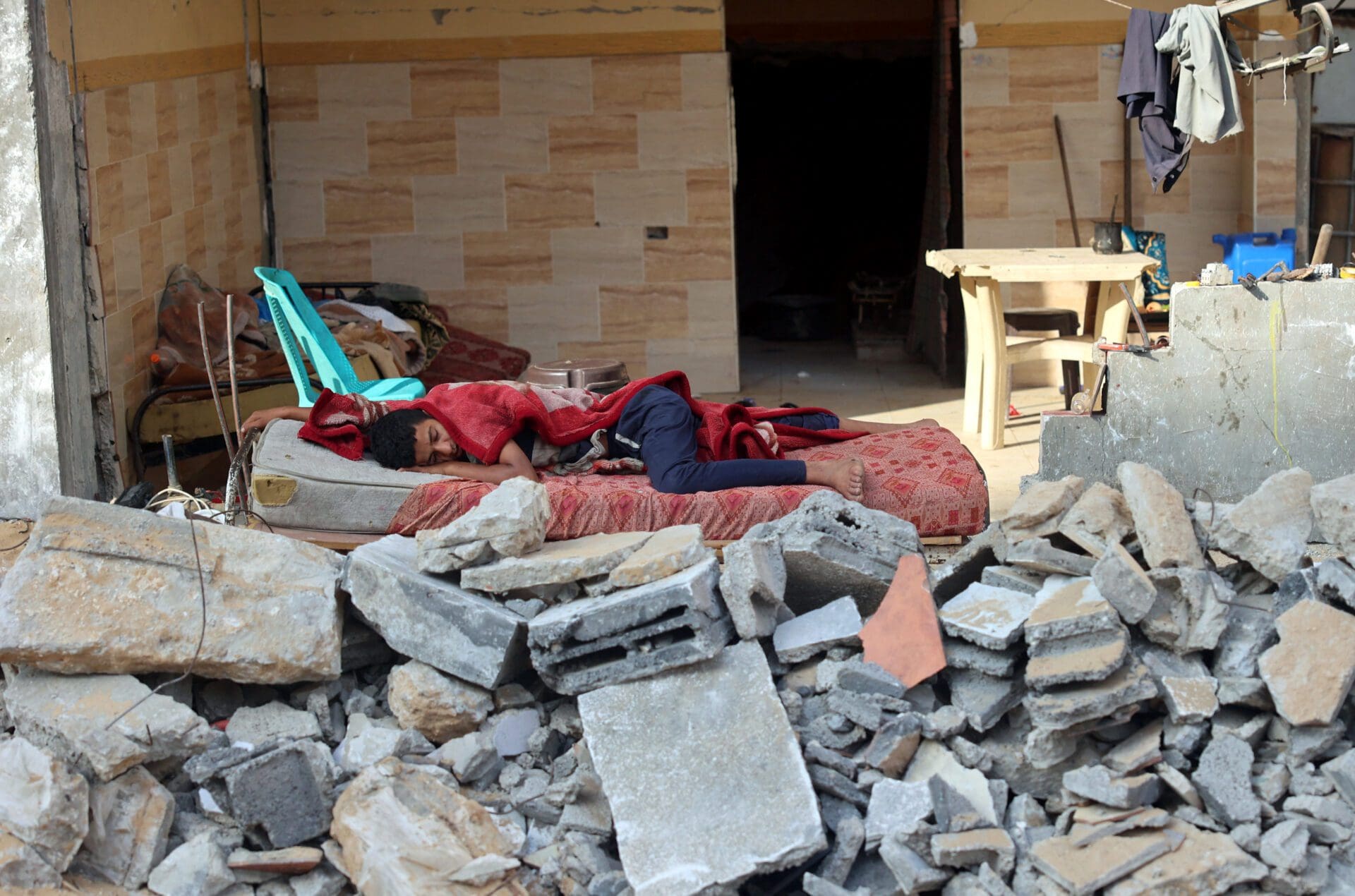

DISMANTLE THE SYSTEM OF APARTHEID IN ISRAEL
There is no place for apartheid in our world. It is a crime against humanity, and it must end.
For decades, Palestinians have been calling for an end to the oppression they live under. All too often, they pay a terrible price for standing up for their rights, and they have long been calling for others around the world to help dismantle the cruel system.
Israeli authorities have enjoyed impunity for too long. The international failure to hold the government of Israel to account means Palestinians are still suffering every single day.
As long as Palestinians are denied equal rights, peace and security will remain a distant prospect for Israelis and Palestinians alike. Let this be the beginning of an end to the Israeli government’s system of apartheid against Palestinians.
Join us in the fight for justice, freedom, and equality for all.



End Apartheid Against Palestinians by the Government of Israel

